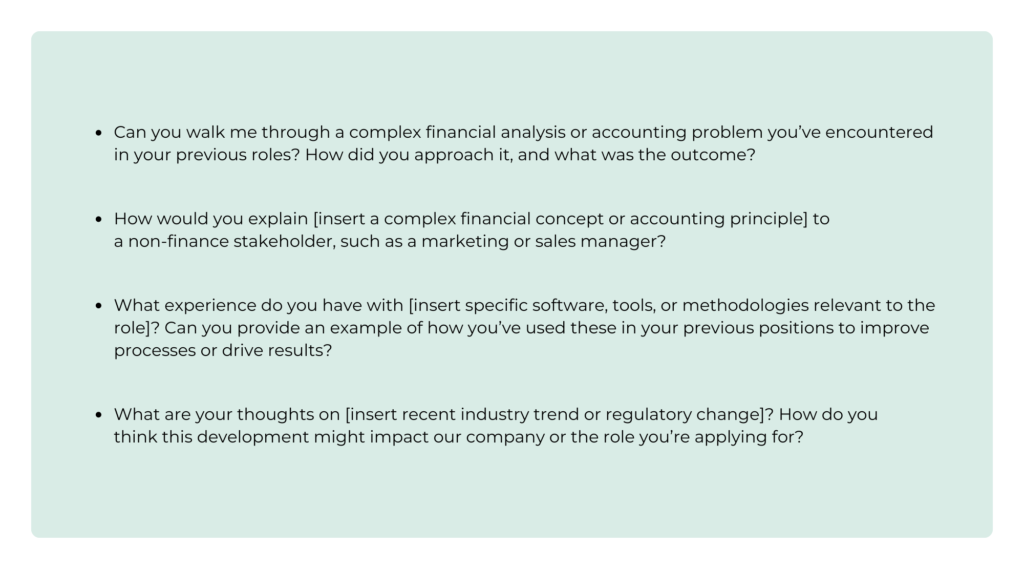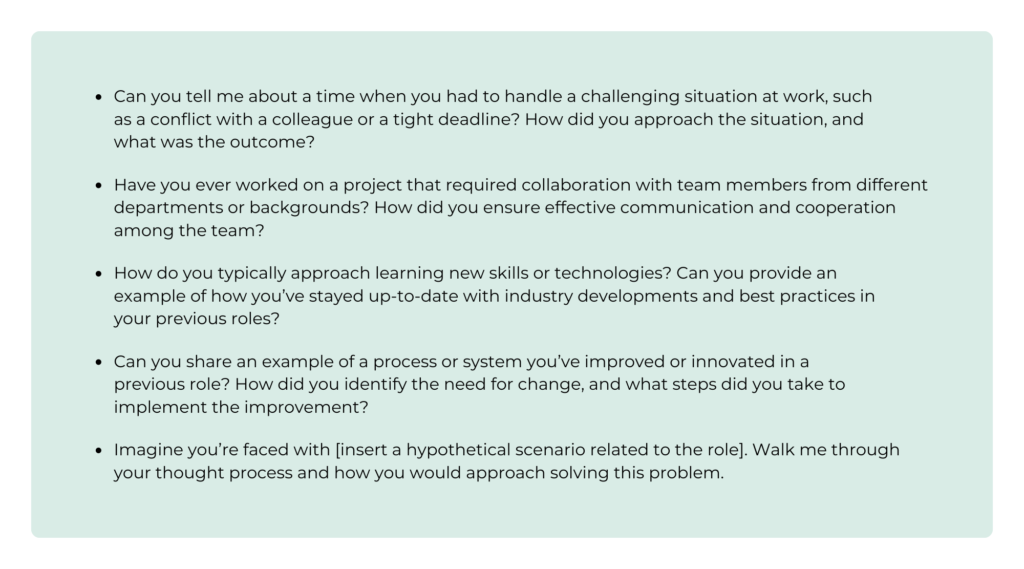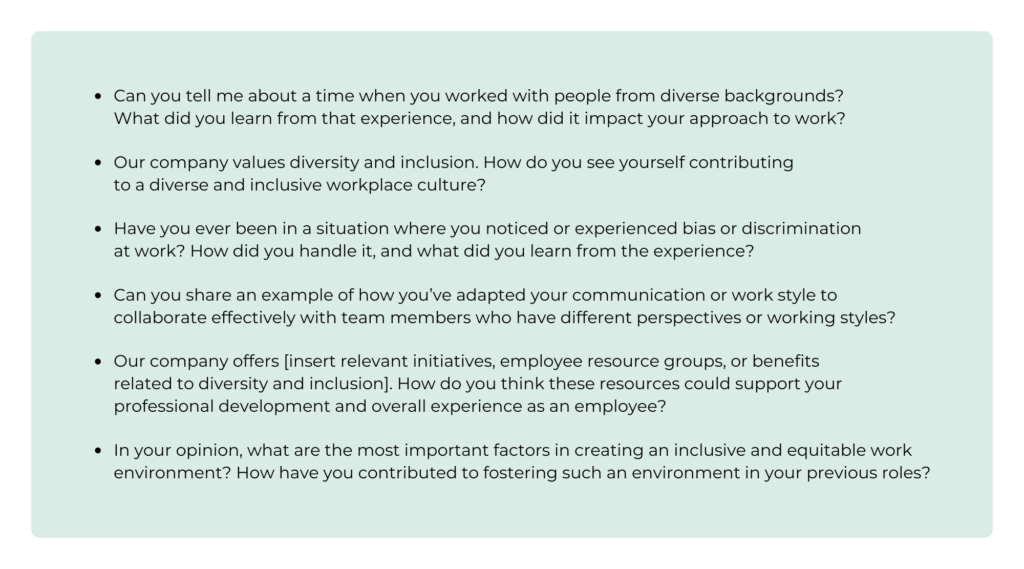There are more lawsuits tied to job interviews than any other part of the hiring process—according to attorneys. And yet, 32% of hiring managers admit they knowingly ask illegal interview questions.
This can lead to discrimination charges, legal issues, U.S. Equal Employment Opportunity Commission (EEOC) investigations, or a damaged reputation for you and your organization. So, whether you’re interviewing candidates for the first time or are a seasoned expert, it’s a smart idea to review what questions you should ask and which ones to avoid.
Illegal Questions to Avoid
![]()
Questions that relate to protected characteristics are strictly off-limits during job interviews. These include a candidate’s age, race, ethnicity, gender, sexual orientation, religion, disability, medical history, or marital and family status.

Here are some examples of illegal questions that employers should avoid:
- How old are you?
- What is your racial background?
- Are you married or planning to have children?
- What religion do you practice?
- Do you have any disabilities or medical conditions?
Asking these questions can be seen as discriminatory and may lead to legal consequences. Even if you don’t mean any harm, these questions can make candidates uncomfortable and create a negative impression of you and your company.
In fact, according to a Resume Builder survey of 1,000 hiring managers, 32% admitted they knowingly ask illegal questions during interviews. To avoid potential legal risks, focus on job-related questions that assess a candidate’s qualifications and ability to perform the role.
Gray Area Questions to Avoid
![]()
We’ve covered the illegal questions, but what about those that fall into a gray area? These questions may seem harmless and are not necessarily illegal. However, they can potentially be problematic by making candidates uncomfortable and leading to accusations of unfair hiring practices.
Here are some examples of grey area questions that employers should avoid:
- What year did you graduate from high school? > This could reveal a candidate’s age
- Do you have any upcoming plans that might interfere with your work schedule? > This could relate to family planning
- What country are you originally from? > This could be seen as discriminatory based on national origin
To avoid these gray areas, focus on questions directly related to the job and the candidate’s ability to perform the role. Stick to topics that assess the candidate’s skills, experience, and qualifications.
Pay History Questions to Avoid
![]()
As of January 1, 2024, employers in Minnesota – public, private, and nonprofit – are prohibited from asking about or considering an applicant’s past or current pay during the hiring process.

This law applies to job applicants looking to join a new company and to current employees seeking a promotion or transfer. It also covers both full-time and part-time work.
Here are some examples of pay history questions that employers should avoid:
- What was your hourly wage or salary at your previous employer?
- Thanks for your interest in transferring departments! I’d like to extend an offer to have you join our team. Before I do that, what are you currently earning?
But what if you’re a job seeker who wants to use your past pay to negotiate a higher salary? Don’t worry – you can still share your pay history voluntarily. It’s all about giving people the choice and the power to advocate for what they think they’re worth.
Technical Skill Questions to Ask
![]()
As an accounting and finance leader, you want to find candidates with the right technical skills and industry-specific knowledge. But, relying on pay history or asking inappropriate questions can hinder your ability to identify the most qualified talent.
So, what can you do instead?
Here are some questions employers should ask to assess technical skills effectively:

Focusing on job-related questions and assessments can give a more accurate picture of a candidate’s technical capabilities and potential fit for the role without relying on irrelevant or discriminatory factors.
Soft Skill Questions to Ask
![]()
In addition to technical expertise, accounting and finance roles increasingly require strong, soft skills like communication, collaboration, and adaptability. As the industry evolves and becomes more digital, finding candidates who can thrive in a dynamic and fast-paced environment is essential.
Here are some questions employers should ask to evaluate soft skills:

Focusing on these topics can provide valuable insights into a candidate’s soft skills, adaptability, and potential to grow and succeed in the role without asking illegal questions.
Inclusive Interview Questions to Ask
![]()
Diversity and inclusion are essential for building strong, innovative, and successful accounting and finance teams. By conducting inclusive interviews and avoiding bias, you can attract a broader range of qualified talent and create a more equitable hiring process.
Here are some questions employers should ask to ensure inclusive and unbiased interviews:

Remember to use structured interview questions and evaluation criteria to ensure consistency and fairness across all candidates. You should also avoid making assumptions about a candidate’s abilities, experiences, or background based on their name, appearance, or other irrelevant factors.
By prioritizing inclusivity and avoiding bias in your interviews, you can create a more diverse and equitable workforce while complying with legal requirements and best practices.
Compensation Questions to Ask
![]()
With the new pay history law in effect, accounting and finance leaders in Minnesota must navigate salary discussions and negotiations without relying on past pay information. This can be challenging, but there are questions you can ask to ensure fair and competitive compensation for your candidates.
Here are some compensation questions employers should ask:
- What salary range would you accept for this position?
- What are your expectations for wages, salary, benefits, or other compensation?
Remember to conduct market research and leverage salary guide data to establish competitive salary ranges for each role based on industry, location, and experience level. You should also communicate salary ranges and compensation philosophy upfront in job postings and during initial interviews to set clear expectations and avoid misunderstandings.
Final Thoughts
![]()
Don’t become part of the 32% of hiring managers who knowingly ask illegal interview questions.
Instead, take proactive steps to ensure your interview process is fair, unbiased, and focused on what really matters – finding the best person for the job based on their skills and potential, not their personal characteristics or past compensation.
With the right approach, you can navigate the minefield of job interview questions with confidence and build a winning team that drives your company forward.
Related Blogs You’ll Enjoy
![]()
- Land Top Talent with These 10 Interviewing Tips
- Balancing Diligence With Speed: Advice From Senior Executive Recruiter Sara Kendrick
- AI Recruiting: A Guide For Hiring Teams and HR

